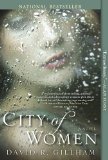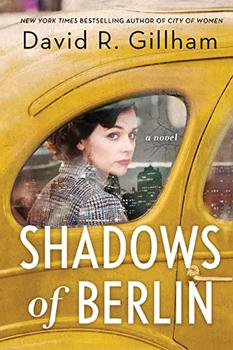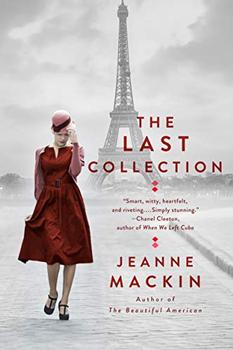Summary | Excerpt | Reading Guide | Reviews | Beyond the book | Read-Alikes | Genres & Themes | Author Bio

A Novel
by David R. GillhamNeedless to say, there is a plethora of WWII novels available, and every time I see a new one on the shelves I wonder what could be left to cover and how an author could possibly make yet another book on the subject seem fresh. In City of Women, first time novelist David Gillham remarkably manages to do just that in this very fine work of historical fiction. He combines compelling characters and vivid descriptions of war-torn Berlin into a fast-paced plot that comes across as a surprisingly compelling and original story.
City of Women centers on the life of Frau Sigrid Schröder, an unremarkable soldier's wife left to keep the home fires burning as her husband heads off to war. Readers experience the atmosphere of a war-torn city through her eyes, first as she goes through her daily routine in the bombed-out city (work, shopping, coming home to her peevish mother-in-law, and occasionally evacuating to the nearest bomb shelter) and then later as she's drawn into a clandestine world she barely suspected existed.
Gillham's background as a screenwriter is evident throughout the narrative; I constantly felt like I was watching an Ingrid Bergman film instead of reading a book. He describes a bombed-out Berlin with an eye for detail so perfect his readers will have no difficulty envisioning the scenes he's depicting.
Beyond creating vivid scenes, the author does a masterful job of conveying the privations and constant sense of tension in the war-torn city. He illustrates the sacrifices the citizens of Berlin make for the war effort, the rationing and constant calls for donations of food and clothing they endured.
Most Berlin display windows are filled with empty boxes now. The signs above them read DECORATION ONLY. "Nur Angrappen" is how it is worded. Berlin has nothing left to sell. It has been reduced by the years of war to grinding coffee from acorns, to drinking wood alcohol mixed with chemical syrup, and to filling up shop windows with "Nur Antrappen." The dairy shop's window is lined with milk bottles, filled with salt.
Also realistically portrayed is the atmosphere of fear and distrust that pervaded every aspect of the Berliners' lives, as small unimportant people found reward and power in denouncing any perceived disloyalty, and the local authorities were more of a threat than a source of security.
The usual crowd pushes on from the commuter trains, and the doors have been closed to the platform, but the train does not move. Nobody talks. Why bother? Delays happen. It's all part of the war. Then the door to the carriage is rolled open, and two men shove their way in. Snap-brim hats and long overcoats. They come to a halt in front of a woman in a threadbare outfit and a kerchief over her tousled brown hair. Her face is colorless and gaunt, she stands hanging from a handrail. "Papers," one of the men demands. The timbre of his voice cuts through dreary silence. It is an official voice. A voice of authority. "Papers. Show me your papers."
One of the book's many strengths is Gillham's ability to create truly interesting characters. The novel has a fairly large cast, and almost all the characters are unique and morally ambiguous; most have ulterior motives or hidden agendas that make them intriguing. Indeed, the book is a page-turner, but not from an action-adventure standpoint. What makes it hard to put down is wanting to know who's a friend, who's a foe, and who's hiding what secret.
City of Women does have a few minor flaws. There are many fine novels with strong female protagonists, written by men (Memoirs of a Geisha by Arthur Golden and She's Come Undone by Wally Lamb are a couple of examples) - that one could swear were written by women. City of Women is not one of them. The heroine's thoughts and actions - particularly concerning her sensuality - don't quite ring true, and the dialog seems scripted and unnatural. I couldn't get over the feeling that one wouldn't speak or act this way in real life. This didn't lessen my enjoyment of the novel, but I never lost the impression that Sigrid was someone's created character.
I also felt the book wrapped up too quickly and too neatly, throwing in one plot twist after another, fast and furious; it felt rushed. And finally, some of the plot elements seemed too convenient, with characters turning up at just the right time to help the heroine out of her difficulties. The scenes are highly entertaining, but not ones that readers will want to spend too much time thinking about - suspension of disbelief is required.
Readers should also be aware that the heroine's sex life is a central part of the plot. The novel contains several passionate scenes that border on the erotic, and especially since none of these are with her husband some may find them objectionable. In spite of its realistic depiction of an important part of history, this is definitely not a book for young teens interested in the time period.
Regardless of these quibbles, I feel City of Women strikes a perfect balance between educating readers about WWII Berlin and entertaining them, and I look forward to Gillham's next novel (there's certainly enough wiggle room in the book's denouement to allow for a sequel). It's an excellent addition to the WWII historical fiction catalog, and most readers of the genre will want to put this one on their lists.
![]() This review was originally published in The BookBrowse Review in September 2012, and has been updated for the
May 2013 edition.
Click here to go to this issue.
This review was originally published in The BookBrowse Review in September 2012, and has been updated for the
May 2013 edition.
Click here to go to this issue.

If you liked City of Women, try these:

by David R. Gillham
Published 2023
A captivating novel of a Berlin girl on the run from the guilt of her past and the boy from Brooklyn who loves her.

by Jeanne Mackin
Published 2020
An American woman becomes entangled in the intense rivalry between iconic fashion designers Coco Chanel and Elsa Schiaparelli in this vivid novel from the acclaimed author of The Beautiful American.
Life is the garment we continually alter, but which never seems to fit.
Click Here to find out who said this, as well as discovering other famous literary quotes!
Your guide toexceptional books
BookBrowse seeks out and recommends the best in contemporary fiction and nonfiction—books that not only engage and entertain but also deepen our understanding of ourselves and the world around us.